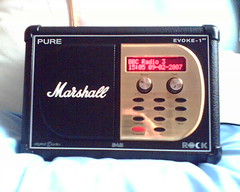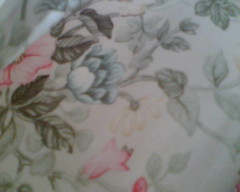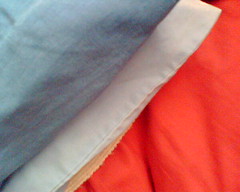Denis and Thomas
Thomas leads me right around to the far end of the bar and through a door into another room, where there are more seats, but where it’s quieter and darker: the ceiling lights are all turned off, and the tables and chairs are only illuminated by the light spilling from the bar; beyond the bright bar lights and the scurrying figures of the barmaids I can see the throng of men that we’ve just passed through. On this side of the bar, there are just a couple of young women in dark coats, talking to each other at the bar, drinking little glasses of green drink that looks thick and sweet with the light shining through it. They look over at Thomas and me, but barely seem to see us, and they turn back to each other and carry on talking in voices that are too quiet to hear.
Thomas climbs up on one of the fat [banquettes?] that line the walls and pulls on a cord to turn on one of the wall lights. Then he moves around the room collecting all of the cardboard beer mats, eventually coming back with a stack about a foot high. He spills them out on the table and sits down before leaning across the table towards me. His eye sockets fall into shadows like a picture of a skull. He whispers, “Those are the lady dancers,” and nods a slow, exaggerated nod.
Most of the beer mats are distorted and corrugated like the furrows in a picture of a ploughed field. When we play trying to stack them up in colour-coded piles, they fall over when the pile reaches three or four mats in height. It’s frustrating. Next we try and make a kind of house of cards, but the edges of the mats are too buckled and irregular, so we start trying to spin them across the table to each other and catch them. We don’t say much.
The fat barman comes into the room and talks to the lady dancers; all three of them leave by a dark wooden door that’s in shadow at the end of the bar.
Thomas says, “Come on, they’ll start in a minute. Let’s watch.”
I nod, wondering how he knows so much about what goes on in this grown-up place, and feeling jealous because I know so little about anything outside of my mama and pappi and my story books. I want to be Thomas’ friend so that I can learn about the grown-up things without having to be with grown-ups and getting laughed at.
The lights in the main bar go off as we try and make our way through the crowd in the other bar. Blue and red lights are shining above the curtains above the little stage, and these and the lights and mirrors reflecting behind the bar create a funny atmosphere, like Christmas lights or a fairy grotto, glinting on beer glasses and men’s teeth and eyes, painting little bits of the darkened world in unusual colours and casting strange shadows.
The men are gradually moving towards the stage end of the bar, and some are climbing up on stools or chairs so that they can get above the rest of the crowd. The crush is too solid for Thomas and I to get through (and it’s a bit scary down here in the dark at our low level, with the men all moving carelessly), so we move to the wall where the windows are and climb up onto one of the well-padded [banquettes?]; from here, we can see, now and again, between the constantly moving silhouettes of the grown-ups’ heads and shoulders, the top third of the curtains and the lights above. There’s a spotlight shining on the curtains, and they now have a rich, bright blue look, the colour of a kingfisher in my story book. The men are talking loudly and laughing, and when they turn their heads sideways to talk to each other we can see their mouths open and close in silhouette and their heads nod up and down.
A burst of applause, whistling and shouting as the curtains open, something joyous and animal about the sound, and it fades down and there’s somebody playing the piano [need to establish its placement earlier…], a bouncy, comical rhythm that makes me think of a camel trying to walk downstairs with big slippers on. The roaring men quieten down, but there’s still a background noise of whistling and isolated shouts and laughs that go along with the piano.
The music changes to something a bit slower, with long repeated phrases that have a lazier, swinging rhythm, like the rhythm of girls twirling a skipping rope in the street. Every now and again the men cheer. Sometimes we see one of the dancing lady’s dark-haired heads moving, spotlit, across the space between the men’s silhouettes, or her white hands in the air above the men’s heads. The lady’s hands and arms look pale, pasty white.
Thomas shakes my shoulder and points towards the bar; one of the men has peeled off from the back of the crowd and is bent over with his hands above his head on the edge of the bar. His back is heaving and hollowing, and slivers of light sparkle and glisten on the strings of stuff that are pouring out his mouth onto the shadow-hidden floor.
Denis and Tommy in the field
Tommy’s swearing as we run, and I’m laughing with the gulping, breathless excitement of the [adrenalin rush] and his characteristic string of profanities, the standard sing-song rhythms of his conversation: “Shit, fuck, shit, fuck, shit…” Then he must trip, because I hear his sudden intake of breath and the thump as the hits the ground. I stop and look around, and there he is, scrabbling his way to his feet amid the mud and snow, swiping the snow off his face. “Don’t stop!” he shouts, “keep fucking running!” I laugh and do as he says.
When I reach the disabled tank, I half-stumble, half-dive under the Leopard’s big exhaust pipes and into the dark space underneath the hull. Another shell explodes behind us, much closer, and I feel the blast’s pressure wave and hear the earth and snow and stones pinging against metal. Tommy’s weight thuds in against the back of my legs and I lie panting, face down in the dirt and snow, smelling metal and burned paint and ash and wet earth. The backs of my legs are wet. There’s cool bluish snow-reflected light in the spaces between the [road wheels].
“Christ, Tommy, that was close. Another five seconds and I reckon that one would have had us.”
Tommy doesn’t say anything, and I jerk my legs to get him to move off them; “Shift, Tommy – you’re squashing me.”
Shells are still exploding, but they’re getting further away now. The one by the tank must have fallen short: it’s the road that they’re ranging on.
Tommy just lays there, though. I think I can feel him shaking.
I kick out again. “Come on, Tommy, don’t piss about – get the fuck off me.” After the exhilaration of the running and the near-miss, I’m excited and [a bit manic, unconstrained], and I laugh as I twist myself around so I can push him off.
It’s not Tommy that’s resting on me, I realise: it’s a dark bundle of something whose shape I can’t make out in the semi-dark. The field outside is bright with sunlight that’s breaking between the thin clouds, and the whiteness is dazzling/confusing my vision and the contrasts here in this shadowed space. Maybe it’s a tarpaulin or something that’s blown off the back of the tank. Which means that Tommy must still be outside, I realise… “Tommy? Tommy?” I shout, and just hear the wind whispering across the snowfield and the stubble. I struggle to get up, desperate to get outside and see what’s happened.
I’m leaning back now, as there’s not enough clearance under the hull to sit up straight [true? Check ground clearance…], and the bundle’s weight is on me legs up as far as the thighs.


